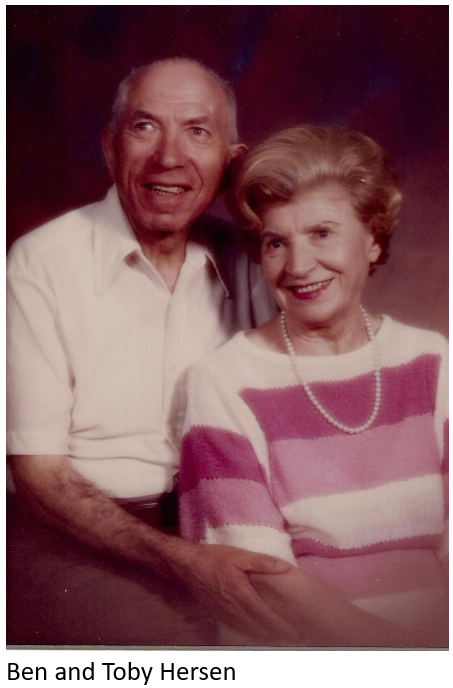Ben Hersen
"Always have a universal profession. "
Name at birth
Bendet Herszkowicz
Date of birth
06/17/1908
Where did you grow up?
Lodz, Poland
Name of father, occupation
Ayzyk Herszkowicz,
Weaver
Maiden name of mother, occupation
Mindla Herszkowicz,
Community nurse
Immediate family (names, birth order)
Parents and siblings: Pearl, Bendet, Chanoch. There was also a baby. Chanoch fled to Israel in the 1930's to avoid the draft. Chanoch died about 25 years ago.
How many in entire extended family?
15
Who survived the Holocaust?
My wife and me, my brother Chanoch who immigrated to Israel in the 1930's; my cousin his wife and their 5 children left Germany just prior to the onset of the war.
Tola and I initially fled east from Lodz with others to elude the advancing German army in 1939. Overtaken by the invasion forces, the Germans impressed me into a labor unit from which I rejoined my wife Tola and we returned to Lodz. For a brief period Tola and I lived in our Lodz apartment while also housing assigned German military personnel. Subsequently, we were forcibly moved to the Lodz ghetto in early 1940 to living quarters that officially allotted 3.75 square meters of living space to each person. Tola, as a pharmacist, an unusual achievement for a Jewish woman growing up in a small village in the early 1900’s, practiced her craft for as long as possible in the ghetto. At great personal risk, Tola slipped out of ghetto posing as a non-Jew on numerous occasions to locate and bring food to relatives in neighboring communities. She continued these forays until these relatives were deported.
I operated my own business in textiles prior to the war and engaged in different types of labor in the ghetto including making corks in the cork workshop. However the work remained transient due to the inconsistency of material, equipment, and demand. Eventually he entered a period of protracted lack of employment, a status that virtually ensured deportation, and a fate that he said many Jews of the Lodz ghetto understood.
In desperation, Tola and I gave much of our remaining resources to an individual who assured us he could obtain work for me. After a period of time I was summoned to the ghetto administration where Mordecai Rumkowski, the appointed Jewish administrator of the ghetto, accompanied me to the central booking office of the ghetto and announced that I, Bendet Herszkowicz would henceforth serve as a bookkeeper for the ghetto.
I continued in this activity until the official closing of the Lodz ghetto in the fall of 1944. After the war I wrote an account of the activities of the Lodz ghetto from his perspective as a bookkeeper published by the YIVO Institute, in 1950. A reparations lawyer for Holocaust survivors and their families remarked that this publication served as “his bible” when prosecuting cases, in that the German government did not dispute the factual accuracy of this document.
In the fall of 1944 a German assigned to the Lodz ghetto by the name of Seifert, devised a plan ostensibly to continue some ghetto labor productivity in Germany. This would also allow him to avoid military activity. He and another German named Stenwers, bought the workshop for constructing emergency housing and arranged to transport it to Germany along with a group of Jewish laborers. The last group of some 500 Jews to leave the Lodz ghetto in October 1944 was incorporated families with children.
These thirty children were the only children to survive the Lodz ghetto. This group fortunately included Tola and I. The men initially were transported from Lodz to Sachsenhausen, Germany and eventually moved to Konigswusterhausen, Germany. The women were transported from Lodz to Ravensbrück, Germany.
I sent a postcard from Sachenhausen to Ravensbrück which arrived; informing the ecstatic women that all the men survived the transport. At the end of the war I, survived a death march, waking one morning to find that the German guards were gone. I found himself in the British/Canadian liberation sector, and consuming soup, instead of the solid, high fat, high caloric food of the allied forces, allowed me to begin my recovery.
I did not want to return to Lodz and immigrated to Sweden. Tola did return to Lodz and Strykow, the village where her family had lived. She did not find any family however she found strangers living in her family home. She left Poland and reunited with me in Sweden in early 1946. We then immigrated to the United States via Canada in 1950.
Name of Ghetto(s)
Name of Concentration / Labor Camp(s)
Where did you go after being liberated?
Sweden
When did you come to the United States?
We came via Canada in 1950
Where did you settle?
Detroit, Michigan
How is it that you came to Michigan?
Sponsoring relative
Occupation after the war
Bookeeper, Electronics business. I had a store, “Universal Music.”
When and where were you married?
1938
Spouse
Tola Sender,
Pharmacist
Children
Florence M. Steinberg and Susan H. Gross
Grandchildren
Six: Diana, Jonathan, Danielle, Lauren, Caroline, and Paul
What do you think helped you to survive?
Position as bookkeeper in the ghetto administration, and MAZEL!!!! (luck)
What message would you like to leave for future generations?
Always have a universal profession.
Interviewer:
Information given by Florence Steinberg, daughter of Ben Hersen and Joel Steinberg, son-in-law
Interview date:
04/06/2011
Experiences
Survivor's map

